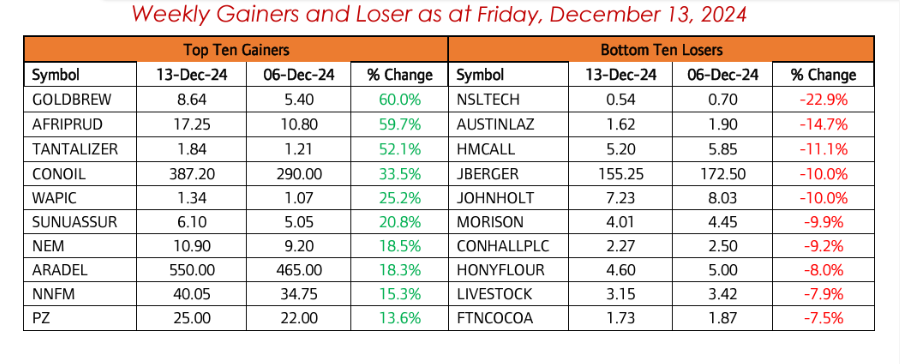This economic news report provides an overview of recent developments across various regions. It highlights inflation trends in the U.S., Eurozone monetary policy adjustments, South Africa’s changing inflation landscape, and growth in Nigeria’s trade and equities markets. It outlines key economic indicators and their implications as possible investment guides.
In November, US inflation increased to 2.70% YoY from 2.60% in October, driven by a 0.50% rise in food inflation. Monthly CPI climbed by 0.30%, with shelter accounting for 40% of the gain. The Federal Reserve may proceed cautiously on rate cuts as inflation remains slightly above the 2.00% target, suggesting slow progress toward this goal.
The European Central Bank (ECB) cut its deposit rate by 25bps to 3.00%, its fourth cut this year amid weak economic growth. Lending rates were also lowered. The ECB said it will closely monitor inflation trends and economic conditions for potential further cuts.
In November, headline inflation rose to 2.90% YoY in South Africa after five months of decline, mainly due to a slower drop in transport costs. However, food inflation fell to a 14-year low at 2.30%. Core inflation moderated to 3.70%, indicating stable price pressures with potential risks from global fuel price volatility.
Nigerian Economy
In Nigeria, economic activity contracted for the second month, with the PMI dropping to 48.90 points. The decline was broad-based, but agriculture showed modest resilience. Trade surplus reached ₦5.81 trillion in Q3:2024, up from ₦4.05 trillion in Q2:2024, driven by rising crude oil and non-oil exports. Oil production increased to 1.69 mbpd in November, significantly rising from October.
Nigeria’s foreign trade report from the National Bureau of Statistics (NBS) shows a remarkable 120.4% year-on-year increase in total merchandise trade, reaching ₦99.34 trillion in the first nine months of 2024, compared to ₦45.08 trillion in 2023. Exports surged 145.8% to ₦57.2 trillion, while imports rose 93.2% to ₦42.14 trillion, resulting in a trade surplus of ₦15.02 trillion—a staggering 931.7% increase from ₦1.5 trillion in the same period last year.
This growth is partly attributed to the depreciation of the Naira, which fell by 41.2% in the official market and 28.2% in the parallel market over the past year. Notably, in Q3 2024, total merchandise trade reached ₦35.2 trillion, with exports growing by 17% and imports increasing by 9%. Crude oil exports were the most significant, comprising 65.44% of total exports, while agricultural exports saw a remarkable 301.87% increase year-on-year.
China remains Nigeria’s largest trading partner, followed by India and the U.S. The data shows Nigeria’s growing trade strength and reliance on energy and agricultural products for foreign exchange earnings.
Money Market
The Central Bank of Nigeria (CBN)’s recent treasury bills auction raised ₦75.78 billion. The stop rates for the 91-day and 182-day bills were steady at 18.00% and 18.50%, while the 364-day rate dipped to 22.80%. There was strong demand for the 182-day and 364-day bills.
In the secondary fixed-income market, the average treasury bills yield slightly decreased to 25.70%, while bond yields rose to 19.50%.
The Eurobond market average yields rose to 9.36%, influenced by profit-taking, concerns over rising US inflation, and anticipation of a Federal Reserve rate cut.
Stock Market Updates
The Nigerian equities market ended the week positively, with the NGX All-Share Index (ASI) increasing by 1.19% to close at 99,378.06 points, approaching the 100,000-point mark. Market capitalisation also rose by 1.19%, reaching ₦60.24 trillion. Year-to-date, the benchmark index recorded a return of 32.90%, with 51 gainers and 35 laggards.

However, trading was subdued, with total volume down 30.12% to 2.72 billion units and transaction value falling 43.41% to ₦49.66 billion. The mixed sectoral performance featured the NGX Oil & Gas sector leading with a 7.61% gain, followed by NGX Insurance at 7.52%. The NGX Industrial Goods sector declined by 0.60%.
Other key drivers included strong demand for ARADEL (+18.28%), MTNN (+3.47%), and CONOIL (+33.52%). Sector performance was generally positive, led by NGXINS (+5.52%) and NGXOILGAS (+7.61%), while NGXINDUSTR (-0.60%) and MERI-AGRIC (-0.53%) saw declines. Top gainers were GOLDBREW (+60.00%) and AFRIPRUD (+59.72%). In contrast, NSLTECH (-22.86%) and AUSTINLAZ (-14.74%) were among the biggest losers. Market activity decreased, with trade volume and value falling by 14.47% and 33.31%, respectively.
Notable gainers included Golden Guinea Breweries (+60%) and African Prudential (+59%). Conversely, NSL Technology topped the decliners, losing 23%.
Conclusion
Expectations for improved crude oil production in Nigeria due to the revitalization of the Dangote Refinery and Port Harcourt Refinery are likely to enhance export capacity. A diversified economy that boosts non-oil exports is essential for sustaining a positive trade balance and enhancing economic resilience.
The Nigerian equities market has seen the All Share Index (ASI) rise 1.19% and is expected to maintain bullish momentum. The year-end rally and strong corporate performance projections support investor buying activities.
Investors should monitor macroeconomic indicators, primarily the November 2024 inflation figures and developments in the foreign exchange market, to guide them in their investment decisions.
Comment, Like 👍, share this article, and Follow us on our social media handles.







